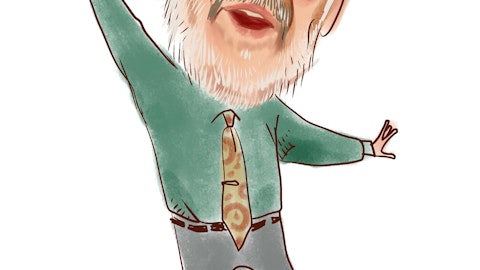And that in the inflation index there are things like cost of houses or cost of a new car. And that if you didn’t buy a new car, if you didn’t buy a new house, your cost of living didn’t change. And you push back. I think now that you’ve had lower, or at least press articles of lesser inflation and things like that, a little bit of that pressure has gone away. The last employment statistic actually showed unemployment up a little bit. Now, Colorado Springs is still a very tight labor market. But, one of the things we’re doing in Colorado Springs that takes a lot of pressure off us is we’ve taken a page from the Hyatt Tahoe. Hyatt Tahoe outsources their housekeeping to a third party. A number of hotels are doing that these days. And so we’ve chosen to do the same thing.
Well, the company that is going to do our housekeeping does the housekeeping for the hospital in Woodland Park, which is the second largest employer in the county. And they also do the housekeeping for the five hospitals down in Colorado Springs. And so Woodland Park is 18 miles from us. And then it in turn is about 20 miles from Colorado Springs. So it’s easy for them to transfer housekeepers from Woodland Park to us, to our property, and then replace them with people from Colorado Springs. And so they can move people around. They’ve already got a workforce and so on. And when we, after negotiating with them, we looked at what we would pay them by the hour and what it was going to cost us by the hour, it was kind of a wash. And they have more resources than we do to move people around and supervise people and so on.
So that’s about a third of the employees we need to hire were resolved with that contract. And so that helps us a lot. Then about a third of the other employees are tipped employees, and that’s going to be relatively easy. And then the last part we’re working on. So I think we’ll be okay up in Waukegan. We continue to hire people. It’s a little more of a challenge there because every employee down at the dishwasher has to go through gaming licensing. And somebody who might be applying for a dishwashing job, that’s a pretty big hurdle when they can go to the Amazon warehouse next door and not have to fill out a 30-page form. We’ve been working through that and we have a pretty stable employee base now, but it’s been a little bit of a struggle.
Anyway, that’s the bottom line. We get asked all the time, do you see signs of a recession? Sometimes I think there might be, but particularly in Mississippi, which is where the economy seems to be a little weak. And then all of a sudden we’ll have a good weekend. And then it’s like, well, no, maybe there isn’t a recession. And then people ask, are you feeling inflation? It’s like, well, on the revenue side, no, I wish our revenues are growing 7% at the older properties. And I think, yes, it’s one of those things when the press is filled with talk about inflation, then everybody starts looking for a raise. And if the press would just shut up about it, maybe we wouldn’t have as much inflation. Some of you may not, in an earlier life, I lived in Brazil and the Brazilian government at one point had to admit that they lie.
And that was because the Sao Paulo newspaper did an analysis of a bunch of prices from one year to the next. And they concluded that inflation was 100% when the government was saying it was 70%. I mean, the inflation rates were nuts. And the minister of finance of Brazil said, well, actually as a tool of combating inflation, we understate what inflation is. Sorry, a little aside.
Lewis Fanger: Thanks, Chad, for opening up that can of worms.
Chad Beynon: Always a good story, thank you for that. And then, Dan, a lot of times when we’re talking to investors, it’s always the what’s next after Chamonix. Lewis, you kind of laid out the spend per head in the market and the opportunity there. And I think everyone’s on board with the returns that could come out of this. But after that’s open, you’ll have two new properties, one property down in the South that’s a good cash cow, the sports businesses, and then a few other smaller properties. But just in terms of kind of the three-year portfolio or how you’re thinking about what to do with the cash, whether it’s pay down the debt, buy back stock at these levels, or look to grow the business, can you kind of give us a little peek into 24, 25, kind of the what’s next after you open up Chamonix right after Christmas?
Lewis Fanger: Well, we get Chamonix open and it’ll take a while to mature, just like it’s taken American Place a little while. And just as it did Bellagio and Boreas and so on, I mean, these things, the second year is almost always better than the first, the third year is better than the second. Usually about that time it’s kind of mature. And now at some point, the city of Waukegan and the State Gaming Commission will probably get that lawsuit resolved from the Potawatomi tribe. And when they do, then it’s hard for us to go arrange financing for the permanent casino when you have a lawsuit out there arguing that you should restart the licensing process. It’s kind of an absurd lawsuit, but it’s out there. And when that’s resolved, I would expect, and it might be a year to 18 months.
And when that happens by then, frankly, we’re going to be one of the least leveraged casino companies out there. And hopefully the bond market’s in better shape and we will go raise money to build the permanent casino in Waukegan. Our obligation is to invest, I think the number’s about $325 million going forward. It was 500 million less what we’ve invested to date. And a lot of what we’ve invested to date is parking lots and land acquisition. So that’s really for the permanent and the license fee itself. And the permanent will be much more obvious and nicer casino than the tent we’re operating in now. So we still have that ahead of us. It’s a pretty big task. It’s not immediate because the lawsuit has it kind of on hold for now. We hope they resolve the lawsuit pretty quickly, but the courts are pretty backed up these days.


